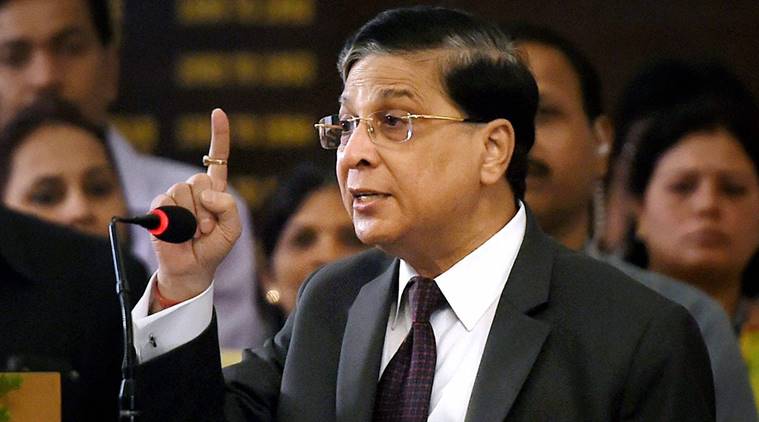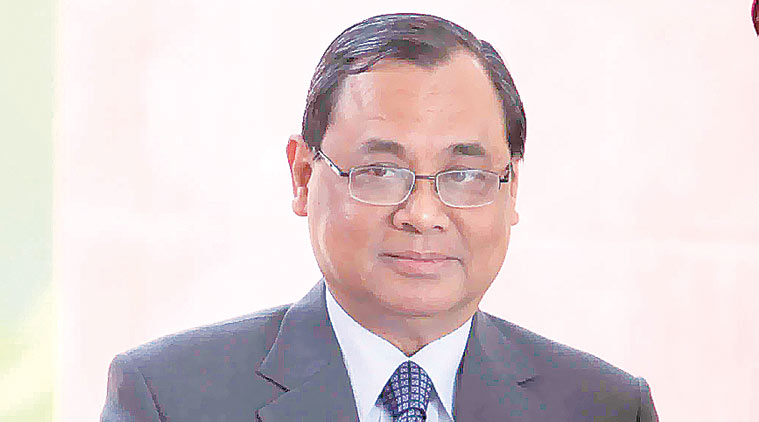 The CJI has not yet responded to their letter. Sources said that when the issue of a full court was raised by some judges during the customary morning meeting of all Supreme Court judges over tea on Monday, CJI Misra was non-committal on the matter.
The CJI has not yet responded to their letter. Sources said that when the issue of a full court was raised by some judges during the customary morning meeting of all Supreme Court judges over tea on Monday, CJI Misra was non-committal on the matter.
Two days after seven Opposition parties gave notice for impeachment of Chief Justice of India Dipak Misra, two senior judges of the Supreme Court, Justices Ranjan Gogoi and Madan Lokur, wrote to the CJI that he call a “full court” to discuss “institutional issues” and “future” of the apex court.
The Opposition notice for impeachment was rejected Monday morning by Vice President and Rajya Sabha Chairman M Venkaiah Naidu. Justice Gogoi is expected to succeed CJI Misra who demits office in October.
In a brief two-sentence letter delivered to CJI Misra Sunday, Justices Gogoi and Lokur, who are members of the Collegium, demanded that he call a “full court” on the judicial side to discuss “institutional issues” and the “future” of the court.
The CJI has not yet responded to their letter. Sources said that when the issue of a full court was raised by some judges during the customary morning meeting of all Supreme Court judges over tea on Monday, CJI Misra was non-committal on the matter.
A full court meeting of the Supreme Court, involving all judges, is usually convened by the CJI when a matter of public importance relating to the judiciary comes up.
This letter follows two other letters by senior members of the Collegium, both written in the past few weeks, which asked the CJI to involve all judges in protecting the judiciary from undue interference by the government.
On March 21, Justice Jasti Chelameswar, the most senior judge, had written to all judges, asking the CJI to all a full court to discuss government interference in appointment of judges to the High Court. Justice Chelameswar’s letter came after the government directly wrote to the Karnataka High Court over an inquiry into a judicial officer, whose name had been reiterated by the Collegium for appointment as a High Court judge. The CJI neither replied to the letter nor did he call a full court.
 Justice Gogoi is tipped to be next CJI
Justice Gogoi is tipped to be next CJI
Besides Justice Chelameswar’s letter, Justice Kurian Joseph had written on April 9 to the CJI and all judges of the Supreme Court, demanding that the CJI set up a seven-judge bench to take up the issue of the government sitting on the Collegium recommendation to appoint Justice K M Joseph and Indu Malhotra to the apex court. A member of the Collegium, he had stated that the government “sitting over the recommendations of the Collegium doing nothing, in administrative law, is abuse of power”.
Sources said that the “institutional issues” and “future” referred to by the two judges now mainly pertain to the independence of the judiciary, wherein the government has been ignoring the recommendations of the Collegium on appointment of judges to the high courts and the Supreme Court.
The government’s actions and CJI’s reluctance to press the issue, they said, has caused consternation among the higher judiciary which is concerned about preserving institutional integrity. This letter adds to the pressure building on the CJI to act to secure the independence of the judiciary and maintain its credibility, sources said.
The tensions between the judiciary and the government have also been reflected in non-finalisation of the Memorandum of Procedure (MoP) after the National Judicial Appointments Commission (NJAC) verdict of 2015. The MoP is envisaged as a set of guidelines dictating the government’s interaction with the Supreme Court but has been pending with the government.
Incidentally, the four judges who have recently written independently to the CJI had jointly penned a letter last November, citing serious concerns about the functioning of the Supreme Court. These judges had released the letter to the public at a press conference this January.